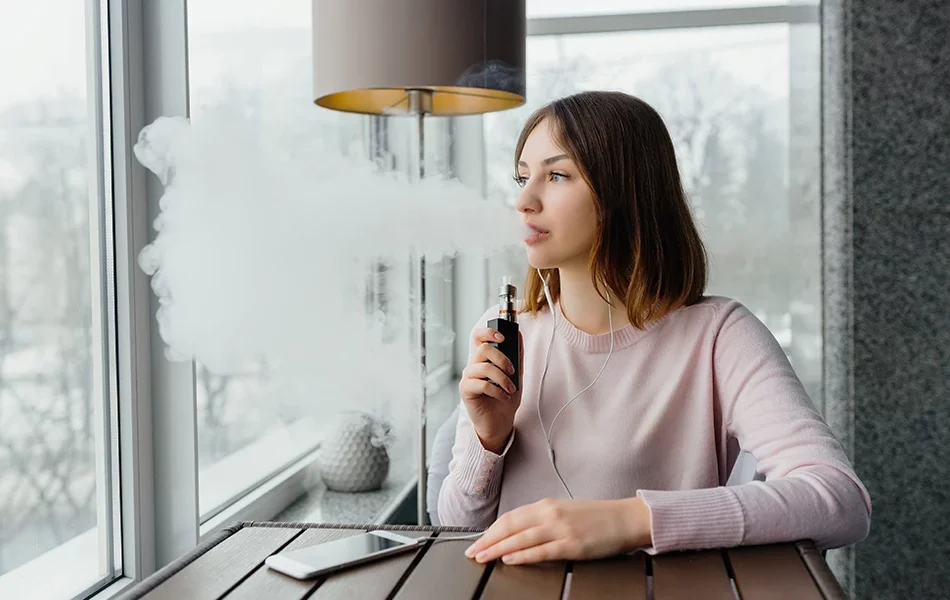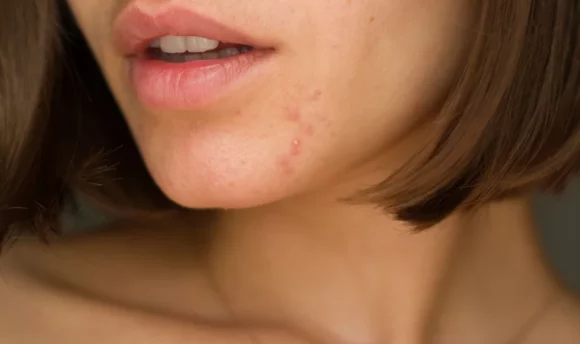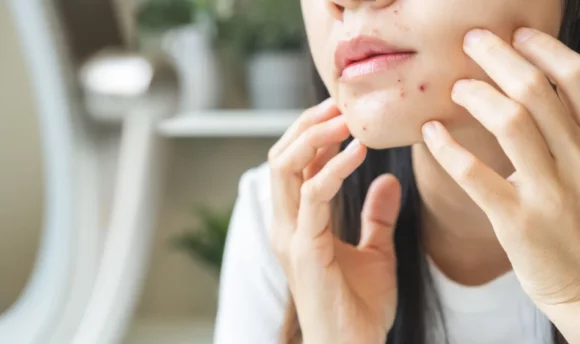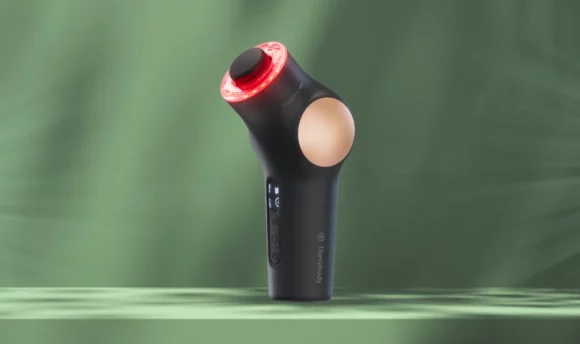Does Vaping Cause Acne? Here's How It Affects Skin Health
Vaping has been linked to several negative health effects, including possible acne breakouts. How does it really affect your skin health, and can you heal your skin after quitting the habit?

Vaping, the process of smoking an electronic cigarette, is meant to mimic regular tobacco smoking. This device releases clouds of vapor that contain nicotine, artificial flavorings, and harmful chemicals that can damage your skin’s health.
People may wonder if there is a link between vaping and acne. Because they’re full of toxins and chemicals, it’s possible that smoking this little device can disrupt the cells that regulate your skin.
So, does vaping cause acne? Discover the truth about how vaping affects your skin, along with ways to prevent acne breakouts.
Does Vaping Cause Acne?
Yes, it is possible that vaping can cause acne. There isn’t much research on the link between these factors, but vapes contain harmful ingredients that could directly impact your immune and skin health. Inhaling an aerosol could be the reason your skin is breaking out.
Vapes contain two prominent ingredients – propylene glycol and vegetable glycerin. These synthetic substances could affect your skin’s natural barrier by sucking out moisture. A lack of hydration will lead to dryness and irritation, which can exacerbate the appearance of acne.
Nicotine, a stimulant chemical in vapes, can also disturb your hormone levels and trigger inflammation. Studies suggest that nicotine increases the stress hormone cortisol, which encourages your body to produce more sebum oil. Too much of this oil can clog your pores easily.
Remember that acne has various triggers and causes. It’s important to speak to a dermatologist to improve your skin and treat acne. If you can, slowly reduce your smoking habits, as continuous vaping can lead to other health problems such as hair loss, lung scarring, and organ damage.
What Is Acne?
Acne is an inflammatory skin condition that causes your pores to get clogged with oil and dirt. Small pimples, cysts, blackheads, or whiteheads usually appear when your hair follicles are not clean. You can get acne anywhere on your body, but primarily on the face.
Anyone can experience acne growing up, especially teenagers. This is because young adults are going through constant hormone fluctuations that increase their oil glands. Excess oil that sits on the skin can stimulate acne breakouts.
There are many types of acne you could experience. Blackheads and whiteheads are non-inflammatory acne that derives from clogged pores. On the other hand, epidermoid cysts represent infection underneath the skin’s surface, which causes inflammation and pain.
Common reasons for getting acne include:
- Hormonal fluctuations
- Genetic conditions, such as cystic acne
- Dead skin cells
- Excess oil production
- Inflammation caused by high-glycemic foods
- Bacteria on the skin that causes clogged pores
- Heavy or irritable skin care products
- Stress
- Side effects from medication
What Are E-cigarettes and Vapes Made of?
Vapes and e-cigarettes are full of damaging and artificial ingredients that can damage your long-term health. Inhaling synthetic chemicals regularly will increase the risk of lung disease, asthma, cancer, addiction, cardiovascular disease, and damaged blood vessels.
A vape pen has a battery that heats up the liquid into vapor. Different brands may use their own chemicals in the liquid. For example, some vape pens have acrolein, which is a herbicide that damages the airway epithelium in your lungs. This irreversible effect leads to shallow breathing and constant chest discomfort.
E-cigarettes and vapes usually contain ingredients such as:
- Nicotine: A chemical that encourages your adrenal glands to release adrenaline. This feeling often leads to addiction and substance abuse.
- Propylene glycol or vegetable glycerin base: Inhaling this synthetic liquid every day can cause problems with your blood pressure and heart rate. Over time, you’ll be more at risk of developing heart disease.
- Water: Vapes with water-based liquids evaporate the flavored water, which releases the smoke.
- Artificial flavor compounds: Flavorings contain chemical substances that damage your lungs and heart. Those who vape may get flavored liquids because they increase the adrenaline boost.
- Carcinogens: A substance that has the ability to cause cancer. Common carcinogens in vapes include acetaldehyde and formaldehyde. These chemicals form when the vaping device creates gasses.
- Diacetyl: This chemical compound releases a buttery-like aroma in vapes, mostly for sweet flavorings. It can increase the risk of bronchiolitis obliterans, also known as popcorn lung, which is a buildup of lung scar tissue.
- Heavy metals: High levels of chromium, lead, aluminum, nickel, and tin can be found in some vapes. These heavy metals could worsen existing lung damage, such as pulmonary fibrosis when inhaled in large amounts.
Vaping and Skin Health: 5 Effects to Consider
Vaping is a dangerous habit for your overall health. The electronic device, like smoking cigarettes, contains many toxic chemicals that can be harmful to your skin. It’s important to understand the risks of vaping and the potentially harmful chemicals in vaping pens before you make it a habit.
Here are some ways that vaping can negatively affect your skin:
#1 Skin irritation
Research suggests that those who smoke e-cigarettes are more likely to develop contact dermatitis. This is because the chemicals damage your skin and cause rashes, dryness, and blisters. Rashes on naturally dry skin will become itchy and inflamed, which is a distressing experience for anyone.
Those with sensitive skin are also more likely to get breakouts since their bodies cannot protect their skin from the vape’s chemicals.
#2 Premature aging
Vaping speeds up the formation of fine lines and wrinkles on your face. Since the vapor dries out your skin, collagen production will decrease. Not having enough collagen in your body can enhance the appearance of hyperpigmentation and wrinkles around your eyes, mouth, and forehead.
#3 Delayed wound healing
Smoking e-cigarettes can slow tissue regeneration and stop your body from healing wounds efficiently. The wound-healing process becomes impaired, meaning you won’t recover quickly from surgery, abrasions, fractures, or typical puncture wounds.
The nicotine in vape pens may also increase oxidative stress, which is the imbalance of oxygen and free radicals in your body. Too many unstable atoms can also increase the time it takes to heal wounds. One example includes the slow healing of acne and scars, which could get worse over time.
#4 Prone to infections
Vaping can damage your immune system and increase the risk of a facial infection. Slow immune functions mean there are fewer protective antibodies that eliminate bad bacteria. You’re more likely to get viral infections such as pneumonia, human papillomavirus (HPV), and herpes around your mouth from sharing the vape pen.
Other potential facial infections include cellulitis, erysipelas, and folliculitis, all of which inflame your skin and can cause acne.
#5 Dry skin
Nicotine causes your blood vessels to narrow, which means your skin isn’t getting enough nutrients and hydration from optimal blood flow. You may notice more dryness and flakiness that comes back even after washing. Dry skin can also lead to other problems, such as eczema, skin fissures, and painful acne.
How Can You Heal Your Skin?
The first step to healing your skin is to quit smoking electronic cigarettes. These two habits can trigger acne and other skin problems, such as premature aging and infections. You can quit vaping by exercising to eliminate nicotine cravings, finding support around you, and reducing stress through meditation.
Once you’ve broken the habit, it’s time to focus on achieving healthy skin. Focus on what your skin needs before creating a routine. For example, if vaping has caused dryness, invest in some high-quality moisturizers that contain glycerin or hyaluronic acid. Inflamed or acne-prone skin may need soothing products with aloe vera and ceramides.
Your diet also plays a huge role in your overall health. Eating nutrient-dense meals can boost immunity and reduce acne. Eggs, salmon, spinach, grass-fed beef, and flaxseeds are popular foods known to promote clearer skin since they contain vitamins E, D, A, and K.
Studies show that a high vitamin intake can help eliminate scarring from blemishes and reduce the risk of clogged pores. Moreover, daily collagen supplementation can replenish your skin’s natural barriers.
However, it’s worth speaking to your doctor to get a dermatology referral. A professional dermatologist can evaluate your skin and determine the best treatment.
FAQs
The chemicals in nicotine can damage your skin by interfering with sebum production. This is a natural oil that regulates your skin, so too much of it can clog your pores and cause acne, whiteheads, or blackheads.
Yes, vaping can trigger cystic acne by clogging pores, drying out your skin, and increasing inflammation. You should see a dermatologist to get the right treatment for painful, pus-filled breakouts.
Vapes contain chemicals that enhance skin sensitivity and irritation, both of which increase the risk of rashes. Propylene glycol, a skin allergen in vapes, may also promote hives and a general systemic allergic reaction in some people.
A Word From a Dermatologist
The epidermis is the outermost layer of your skin, which is responsible for protecting your body against environmental factors. Some factors may be bacteria on surfaces, UV radiation, and chemicals. Since this skin is most vulnerable, you’re more likely to damage it through habits such as vaping and tobacco smoking.
The same goes for the underlayer called the dermis, which contains sweat glands, hair follicles, and blood vessels. Harm to these skin layers could result in acne, psoriasis, infection, and premature aging.
Quitting smoking can do wonders for your long-term health. You could breathe easier and feel healthier overall. Taking the first step may seem daunting, but you can get the right support from medical professionals. Always talk to your doctor before seeking treatment for acne and withdrawal symptoms.
To treat acne, use an aloe vera gel to reduce inflammation. You can also use a tea tree oil treatment to eliminate bacteria that would cause breakouts. For more severe cases of acne, a doctor may prescribe lotions containing benzoyl peroxide, topical retinoids, or azelaic acid.
Conclusion
Smoking vape pens can cause skin problems such as dryness, infection, inflammation, and possible skin cancer. Therefore, eliminating your vaping habit can improve your long-term health and prevent lung disease. To quit e-cigarettes, seek the help of a healthcare professional.

















































 Select your language:
Select your language: 








